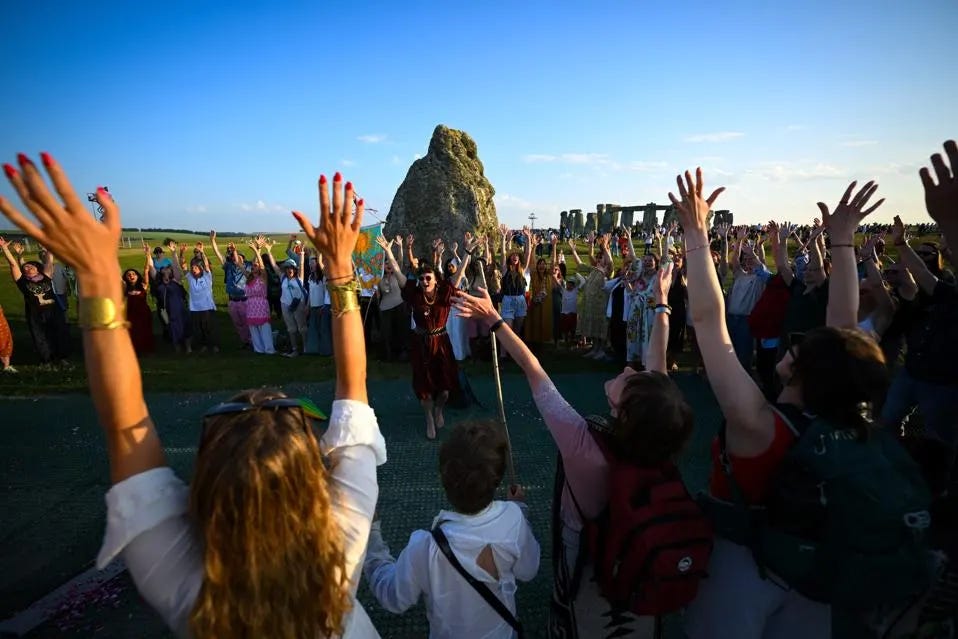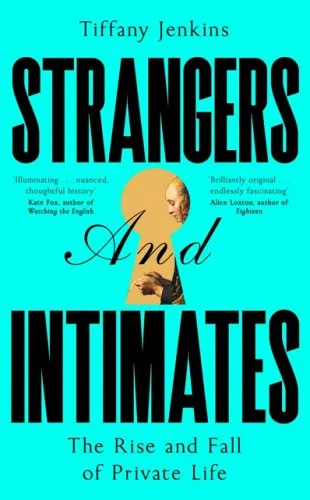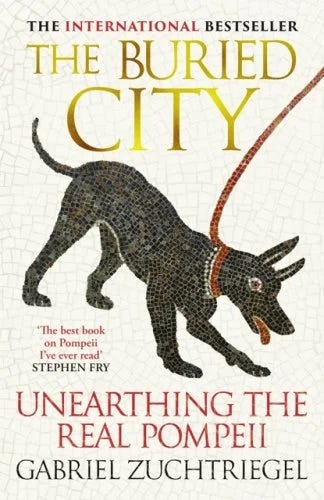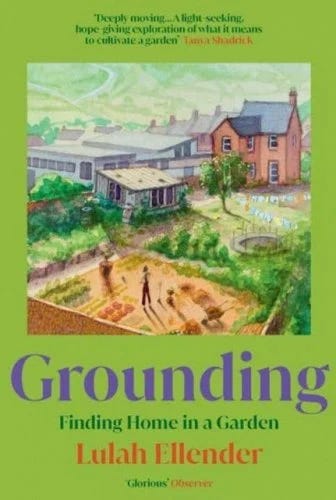June was a fast, hot, hard month. As it turns out, my house stays fortunately cool in the blazing heat which will surely serve me well in the years to come. When the solstice came, my hometown, so near to Stonehenge, was suddenly delightfully full of sleepy hippies. I spent the last week of the month in a field in the Chalke Valley, leaving me with some rather fetching tan lines. I finished fewer books this month in part because I spent so much of it outside doing things, in part because I am making my leisurely way through some rather huge biographies and histories.
Strangers and Intimates: The Rise and Fall of Private Life by Tiffany Jenkins (2025) - This is an unusually structured book. Each chapter focuses on a different historical case study and it reads like a collection of non-fiction short stories. Of these stories, which range from Thomas More to Silicon Valley, the first three quarters are solely focused on Britain. The book then suddenly lunges to America, without any explanation or acknowledgement, which was jarring. At the end of each chapter Jenkins summarises what each example means for our understanding of privacy, but this analysis is often very brief. The final chapter, which in theory ties everything together, is far too scant given the wide range of material that has been covered. I also would have liked to see at least one chapter on how colonial subjects experienced privacy, or the lack thereof, and imperial considerations of who is entitled to a private life.
The strongest aspect is how women’s history is interwoven throughout, in a way that is often lacking from thematic non-fiction narratives. Rather than designating one lonely chapter to women, Jenkins explores how the development of a private sphere created a space of danger for women, with many women’s rights campaigners coming ‘to see the very existence of the private realm as the precondition for violent oppression’. The focus on sexual politics leads to some interesting and slightly odd conclusions, but they are well argued nonetheless. Jenkins quotes many feminists such as Catharine MacKinnon, the legal scholar and pioneer in sexual harassment law, who strongly criticised the divide between the public and private spheres, ‘arguing that the right of privacy was a right of men "to be let alone" to oppress women one at a time". The chapter on Monica Lewinsky was by far the strongest, and explores this notion in fascinating detail. Linda Hirshman’s quotes are pertinent:
‘Keeping quiet about sex was one of the most anti-women attitudes that we can have.
For centuries, sex was confined to the secrecy and privacy of the private home. And within that home, we know, enormous amounts of wrongdoing occurred: domestic violence and so forth, as well as happy, loving sexuality... It hurts women to draw that curtain. We need to bring sex out into the light… and look at it as a matter of moral theory, and political theory. It's not tawdry to do this. We need to be concerned about this, and the harm that will befall Monica Lewinsky is an example of that’.
Despite this, Jenkins concludes strongly in favour of a private sphere in which we can say and do things that we would not do in public. The importance of this seems to be the argument that this private, more relaxed and unjudgmental space is a necessary pre-condition for a thriving public life. A curious book, one that frustrated but intrigued in parts.
Agent Sonya by Ben Macintyre (2020) - This is the extraordinary true story of Ursula Kuczynski, a German Jewish woman who became a lifelong communist and Soviet spy in response to the patriarchy and the rise of the Nazis. Kuczynski is a classic demonstration of why I enjoy researching activists. Their belief can drive them to do wild things, and in this particular case she was both staggeringly brave and intelligent. As a woman Kuczynski was denied the opportunity of higher education, leaving her unable to become an academic like many of her male relations. Instead she lived a globe-trotting life of danger. Agent Sonya is an international saga. The latter stages will likely be more familiar, featuring the conflict in western Europe and the race for atomic secrets. More unusually, and therefore interestingly, a large portion of the book covers fascinating adventures in pre-war China.
While Kuczynski did have children, the prominence Macintyre gives to her role as a mother is completely and utterly at odds with how a father would be written about. Notoriously I can’t stand books about women of the SOE, as the well-meaning desire to present women of the second world war who had ‘agency’ ends up suggesting a distorted role in history. Kuczynski’s work however was highly influential. Without giving away any spoilers, she was involved in several pivotal moments of the twentieth century.
Not to diminish Macintyre’s achievement, but the effort here is not one of research but assemblage. The Kuczynski clan were very literary, a trait Ursula passed on to her children, who all left memoirs. Nevertheless there is great skill in finding stories like this and bringing them to light. This would be an ideal summer read for anyone who likes stories of espionage. In a glumly predictable bit of publishing flummery, the hardback cover features a silhouette of a woman on a bicycle (a crucial detail), shrouded in grey smoke. It’s fairly subtle for this genre. Yet the paperback cover is emblazoned with Nazi imagery, even though this is not a book about the Nazis. Suffice to say, I went for the hardback.
The Buried City: Unearthing the Real Pompeii by Gabriel Zuchtriegel, translated from German by Jamie Bulloch (2025) - This is a very short book that I read so quickly, it’s already become a bit of a blur. I may well read it again when the paperback comes out because there’s some valuable wisdom here. Zuchtriegel is the head honcho at Pompeii and he shares insights from his meteoric career, along with some reflections on the practices of history and conservation. The memoir elements were fascinating. He was the youngest person appointed to run the site at Pompeii, and the first German (which proves to be a challenge). Ostensibly inspired by the latest archaeological discoveries at Pompeii, this is a book more about the politics and philosophy of curation and fundraising for humanities. Zuchtriegel is generous with his knowledge, at no point speaking down to the reader, and urging for a more humane approach to history.
We tend to feel superior to the people from [the past] because we fly in aeroplanes or own smartphones. In truth the people of the Stone Age possessed skills and knowledge that we have long forgotten. And without the Middle Ages we would have virtually nothing from the ancient philosophers and writers, for most of it was preserved only thanks to mediaeval manuscripts.
It’s a sneaky bit of publishing to market The Buried City as though it’s a standard book about the history of Pompeii, and I don’t think the reality is what many readers will expect, (not least Zuchtriegel’s diversions into gender and sexuality). For a more straightforward and archaeology-focused account of the latest discoveries in Pompeii, there is an very fine documentary available on BBC iPlayer, starring none other than Zuchtriegel.
Grounding: Finding Home in a Garden by Lulah Ellender (2023) - After writing about gardens recently I wanted to read something on the subject that I could relate to. Turns out, this is not easy. People who write about gardens understandably tend to know a lot about gardening (which I do not), and possess enormous plots of land (which I do not). Such books can make for charming escapism but I was looking for more of an ally. Grounding stood out because the premise is unusual for the genre. Ellender’s home is rented, and at the start of the book she is told her landlord may be booting her out. This short memoir then recounts how Ellender responded to uncertainty by gardening, all while grieving for her mother. In fact, there is an awful lot of fairly cloying stuff about motherhood in Grounding, which was not alluded to in the jacket copy. Like most garden books, it assumes a lot of knowledge and offers little explanation. Ellender was raised to know all about plants, and those of us who were not are left guessing. The book is at its best when it shows the indignities that come with housing insecurity. The scene where a property manager comes round to inspect the house and make a list of improvements that need to be made, not for the benefit of any of the residents, was brilliantly chilling. Grounding is certainly a step in the right direction for garden books but the genre still has some way to go. As do I. By the time I share my notes for next month, I should have a garden of my own…








